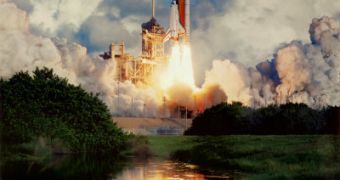I didn't think it would take so long, but here we are. The launch of the space shuttle Atlantis was delayed with more than two months. After refusing to schedule the next launch attempt, in the outcome of the external fuel tank sensor test, the Atlantis space shuttle program flight manager revealed that the it will make a new launch attempt on the 7th of February.
The faulty connector, which caused two of the fuel gauges to fail during the test on December, started being installed yesterday in order to respect the newly scheduled launch date. The respective part has been replaced with a freshly manufactured one, while the connector which was extracted from Atlantis' external fuel tank was sent to the Marshall Space Flight Center, where it is still being tested in extreme temperature conditions, as it seemed that it only failed while the fuel tank was being filled, when it experienced wide temperature variations.
On top of the tight schedule NASA has to deal with, the space agency also had some work around the Progress 27 spacecraft which will be launched towards the International Space Station with a two day advance, in order to deliver some additional supplies. A similar spacecraft was sent during last month, providing the astronauts with new food supplies, oxygen and fuel, after which the spacecraft was filled with waste and sent falling down onto the Earth's surface.
NASA's spokesman George Diller argues that the connector is to become fully operational today, and will probably be followed by a series of new tests during this week-end. The fuel gauge problems started right after the space shuttle resumed the flight, following the investigation that was undertaken after the Columbia disaster. Although it represents one of the critical systems of the space shuttle, shutting down the engines when the fuel tank is empty, NASA didn't give much thought to repairing the faulty sensors.
This happened mostly due to the sloppy launch rules which allowed a space shuttle to lift off even if one of the four fuel gauges was malfunctioning. After changing the rules in the outcome of the first launch attempt that took place on 6 December last year, NASA seems to have run out of luck.
Atlantis was supposed to take the European space laboratory Columbus to the ISS and, most likely, it will be followed by the Discovery space shuttle which will fly the massive Japanese laboratory somewhere in the middle of Mars. A third trip to the ISS this year, with the spacecraft Soyus, will refresh the space station's crew. Currently, NASA has less than two years to complete the ISS, in order to replace its decade-old spacecrafts, which, more or less, seem to be falling apart.

 14 DAY TRIAL //
14 DAY TRIAL //